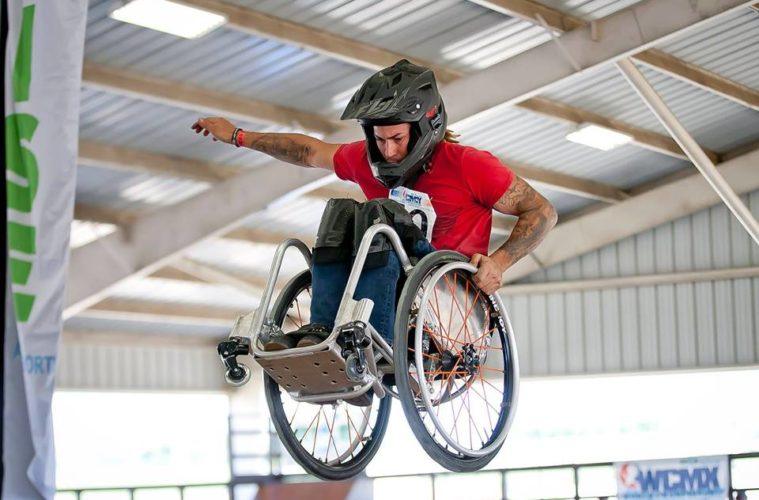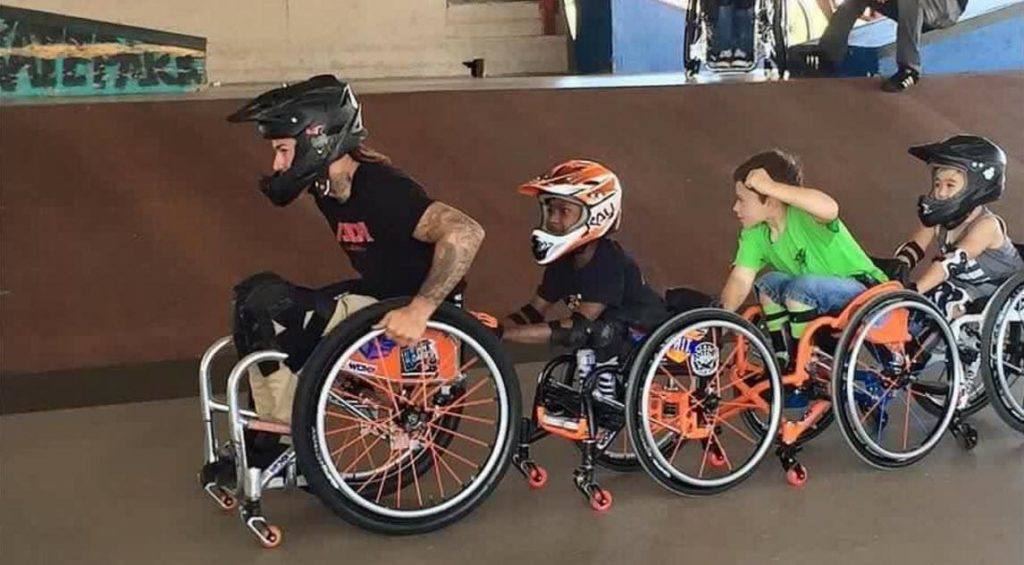 Cure Advocate Jerry Diaz of Kissimmee, Florida, couldn’t see a way out of the miserable world he was living in six years ago. He stepped out into a lane of heavy traffic hoping to commit suicide but thankfully, he failed.
Cure Advocate Jerry Diaz of Kissimmee, Florida, couldn’t see a way out of the miserable world he was living in six years ago. He stepped out into a lane of heavy traffic hoping to commit suicide but thankfully, he failed.
After spending months in rehab after being paralyzed from the waist down, Diaz created a new world for himself. Today he’s one of the world’s top WCMX stars.
WCMX, or Wheelchair Motocross, is the fastest-growing adaptive sport in the world.
How Jerry Diaz Found WCMX
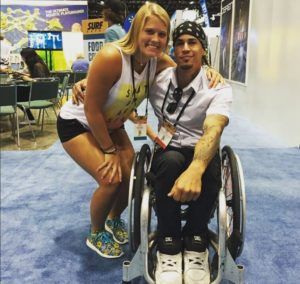 One day after Jerry felt he’d healed enough, he visited a skate park with friends and watched them go down ramps on their skateboards. He said that even though he was paralyzed, he couldn’t see any reason he couldn’t do the same thing. Before long, he was having fun pulling tricks at skate parks in his wheelchair. “
One day after Jerry felt he’d healed enough, he visited a skate park with friends and watched them go down ramps on their skateboards. He said that even though he was paralyzed, he couldn’t see any reason he couldn’t do the same thing. Before long, he was having fun pulling tricks at skate parks in his wheelchair. “
The first thing I learned and always advise everyone entering this sport is to get some type of device to keep your butt firmly planted in your wheelchair.” Jerry explains.
Safety First: Jerry advises those wanting to try WCMX to wear a seat belt, a full face helmet, gloves and pads, and use a back/spine protector.
When Jerry first tried out a trick on a ramp, he got some air, flew out of his wheelchair and broke his leg. That’s why today he straps himself and his feet to the wheelchair, as all WCMX competitors do.
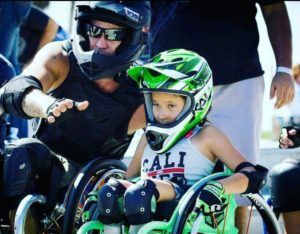 Diaz suggests going online and typing in the words “motorcycle spine protector” to see various braces available. These devices are vests made out of hard plastic that go all the way across your shoulders or resemble a vest with the sleeves cut out of it. “I use one made by Leap and one made by Icon Field Armor,” Jerry shares.
Diaz suggests going online and typing in the words “motorcycle spine protector” to see various braces available. These devices are vests made out of hard plastic that go all the way across your shoulders or resemble a vest with the sleeves cut out of it. “I use one made by Leap and one made by Icon Field Armor,” Jerry shares.
“Go to a skate park, and watch the people on skate boards. There are all kinds of ramps to throw tricks. The most basic is a quarter pipe – similar to rolling down a driveway but dropping off at a little steeper angle and higher up than most driveways. Get the feel of going down the ramp in your wheelchair.”
Jerry emphasizes that learning to “throw” tricks and/or competing in WCMX competitions builds confidence in more ways than one. “One of the advantages is WCMX also helps you build everyday skills that you can use outside of a skate park.”
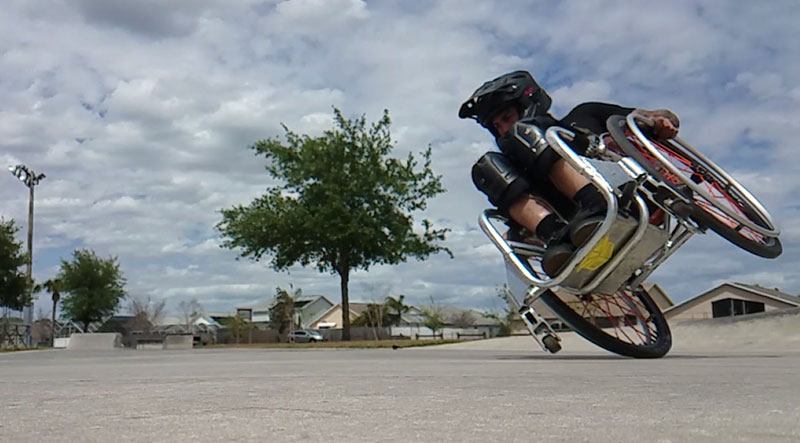
Learn all about WCMX at Abilities Expo Houston from none other than Jerry Diaz!
Jerry recommends that first you learn how to go up and down a flight of steps, since you’ll probably encounter inaccessible skate parks. Jerry says you can descend steps in two ways. “To go down backwards, I hold onto the hand rail, lean forward and guide my way down each one of the steps,” Jerry describes. “If I want to go down the steps frontward, I pop a wheelie, get my front wheels off the ground and move down the steps on the two back wheels.”
Jerry became interested in learning to do these tricks by watching YouTube videos of Aaron “Wheelz” Fotheringham’s, who is the pioneer of WCMX. It was just the inspiration Jerry needed to understand what was possible for people who roll.
“Those tricks weren’t nearly as easy as I thought they were,” Jerry says.
“I kept watching Aaron’s videos over and over and studied and learned every move he made in his wheelchair to complete a trick. After many crashes, I’d figure out how each trick was done, and I’d be able to throw many of the tricks Aaron was.”
Want to try WCMX? Jerry has you covered.
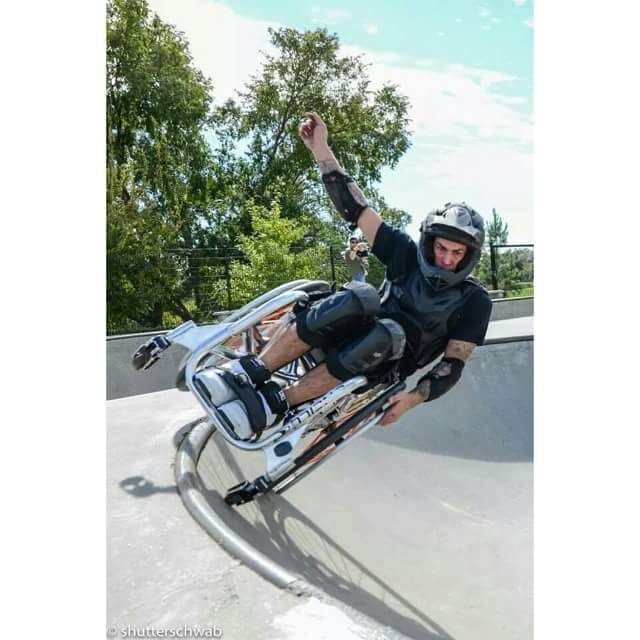
A few months ago, Jerry made an instructional video on how to do some of the tricks he’s learned. Jerry covers the basics like riding on one wheel, getting up off the ground on your chair and dropping in to a half pipe or a ramp.
Jerry says he’s considering making other instructional videos to teach people in wheelchairs how to throw more difficult tricks, ride bigger ramps and ride the grinds – so if you dig his stuff, be sure to let him know!
“A grind pole I ride at one of the skate parks I visit is set-up on a slope to keep from taking off on a ramp and having to jump to land on the bar. Most grind bars are set-up in the air, so you have to jump up on them. But this grind bar is at the end of a slope, enabling you to go down the slope and transition to the grind bar. I think the toughest tricks for me are the ones I’ve learned to do on the ground, like balancing a chair on one wheel and turning in circles.”
“If you live near a skate park where skilled skate boarders go, you can see and learn a lot of tricks from them and then adapt the skate board trick to your wheelchair. I try to make the videos like I wished I’d had when I first started learning these tricks. I hope to reduce the number of crashes that people learning the sport may have.”
learn wcmx basics from Jerry Diaz at the Houston Abilities Expo
Meet Jerry Diaz in person at the Houston Abilities Expo at the NRG Center on August 4-6, 2017! Jerry will be demonstrating some of tricks and talk with attendees about WCMX and how he developed his own style.
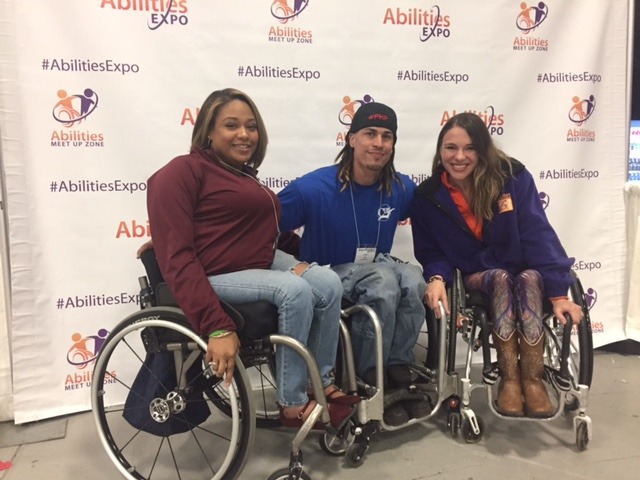
Get your picture taken with Jerry at the Houston Abilities Expo, like Andrea and Kristina did!
Jerry’s mission in life is to show people that he can do anything while riding his wheelchair! When not perfecting his own skills, Diaz conducts seminars and competes in WCMX (Wheelchair Motocross), an organization created by Aaron Fotheringham and Christian Bailey about 10 years ago. He’s looking forward to answering your questions during the Abilities Expo about learning what you can achieve with your wheelchair.
Get Your Free Pass to the Houston Abilities Expo here.
 What’s Holding You Back from Trying a Sport?
What’s Holding You Back from Trying a Sport?
Jerry says the it’s the fear factor that keeps people from getting involved in WCMX. “The only way that you can beat any fear and overcome it is to face that fear and try that trick. Many people in wheelchairs are more comfortable with sports like basketball, track and field, wheelchair rugby and wheelchair tennis.”
“But I feel that if someone can break the stereotype of a person in a wheelchair by performing tricks that everyone thinks are impossible, then learning those tricks is a worthwhile ambition.”
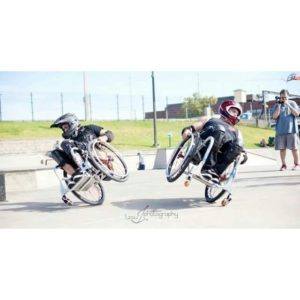
The hardest trick for Jerry to learn was spinning on one wheel. And, before you try this one, you need to make sure your chair is set up correctly. Some people have cambered wheels on their wheelchairs (picture a sports chair with the slanted wheels). But Jerry emphasizes that to throw this trick, your chair can’t have cambered wheels.
“Once you learn to balance yourself in a wheelchair, and you have the amount of speed you need to have to turn on that one wheel, then doing this trick isn’t too hard. However, figuring out that speed and balance for you and your wheelchair sometimes involves many tip overs.
“To ride a wheelchair at a skate park, and start learning tricks, you need a wheelchair that’s built for that type of activity. For instance, my wheelchair has full suspension with shocks on the wheelchair’s back axels and front casters. This prevents my chair from breaking and me from crashing when I hit the ground after going down a ramp and getting some air. I use my skate park wheelchair as my everyday wheelchair and can put the shock absorbers on or take them off.”
The right equipment is crucial for WCMX. Riding an everyday wheelchair at a skate park is dangerous.
Jerry uses a custom chair made by Mike Box of Texas, who builds WCMX wheelchairs. Several companies build WCMX wheelchairs, but Mike Box was a pioneer of this type of wheelchair and one of the first people to build a chair for Aaron Fotheringham.
“Mike has asked me to try and break his chairs, because when someone breaks a wheelchair then that tells Mike what he needs to do to improve the design,” Jerry reports. “He’s trying to find all the weaknesses of his WCMX chairs to create better ones.”
From Your Average Guy in a Wheelchair to a Rock Star in air

Jerry tells friends in similar situations to TRY A CURE!
One of the things Jerry enjoys most is going to a skate park where he’s never been before. “Everybody looks at me, and I know they’re thinking, ‘What’s this guy in a wheelchair doing in a skate park?’ I’ll adjust my wheelchair, put on my helmet and safety equipment and start riding, jumping ramps and throwing tricks. People will come over to me and say, ‘Hey man, that’s really amazing what all you can do.’”
“I go from being a ‘crippled guy’ at a skate park to being a rock star. Some folks will say, ‘I wouldn’t even attempt to do some of those tricks you’re doing.’”
“What’s really fun is that some people will ask, ‘Are you really paralyzed, or are you doing this for fun?’ I tell them about the sport of WCMX and its competitions. I’m really changing people’s perspectives of what a person in a wheelchair can do.”
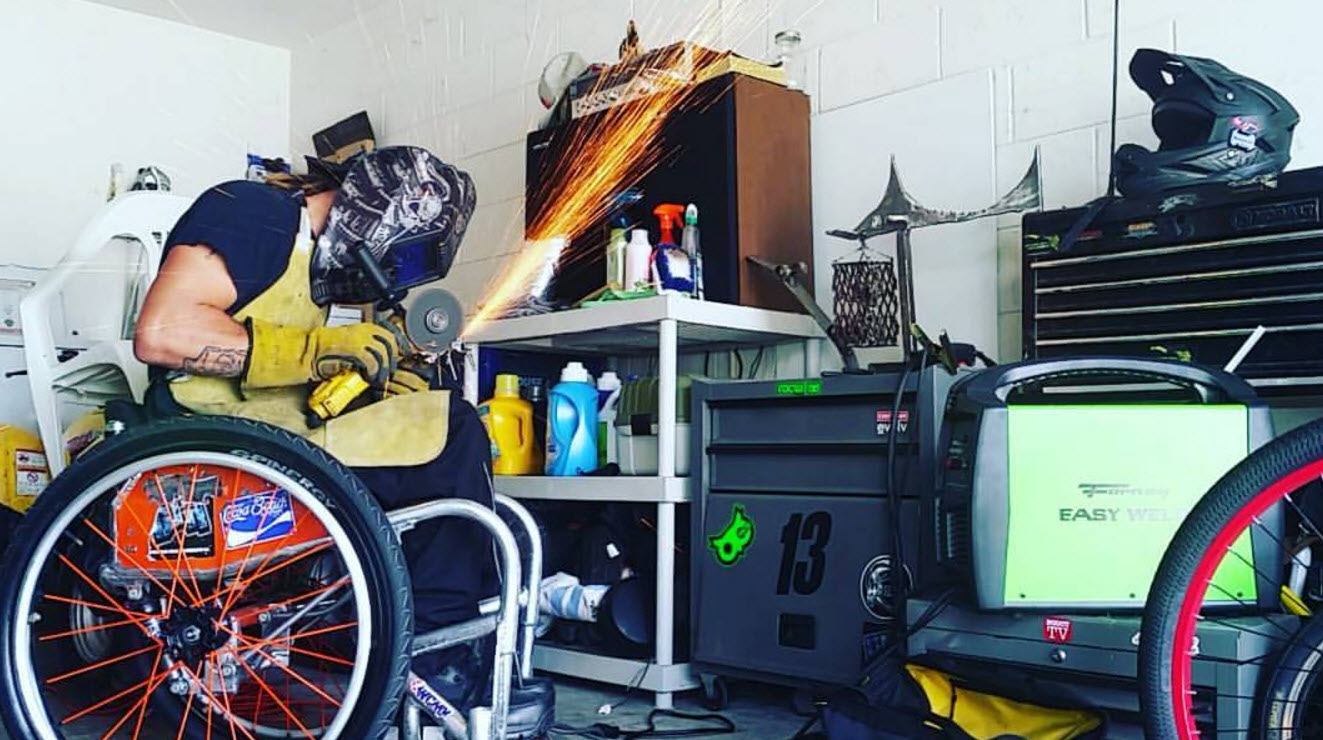
Jerry is also an accomplished artistic welder and does that for a living when he is not competing in WCMX.
Why Jerry Diaz Chooses a Cure Catheter
One day in the not too distant future, I hope research scientists will find a cure for spinal cord injuries. By using Cure catheters, I’m helping to support research, because 10% of the net income from Cure is donated to spinal cord research to help me and other people with spinal cord injuries.
If you can’t afford to donate money for spinal cord research, then by using Cure products, the company donates for you and for me.
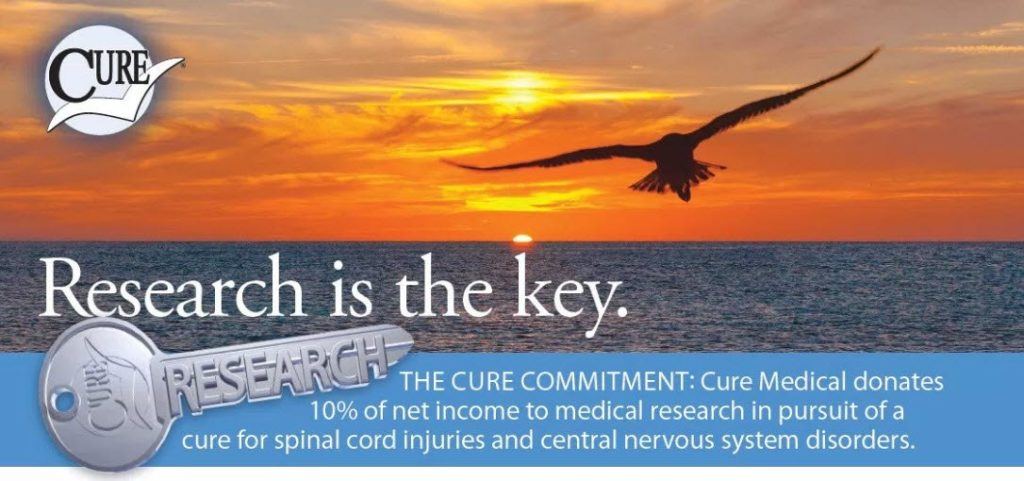
I’m often asked which catheters I use. I like the Cure pre-lubricated closed system catheters, because the tubes don’t kink-up or collapse. Also, each catheter comes with the tube and the bag all connected. Then I don’t have to get a water bottle to attach to it or sit on the toilet.
Video: WCMX Star Jerry diaz shares why he uses the cure medical closed system
I haven’t had a urinary tract infection for 4 years, and I think that’s because I use Cure catheters.
Please know that I’m very diligent too about washing my hands before and after I use the catheter, and I wear gloves when I self-cath.
I’m able to get my Cure catheters through my medical supply company. The medical supply company calls and checks on me to find out when I need more catheters shipped to me.
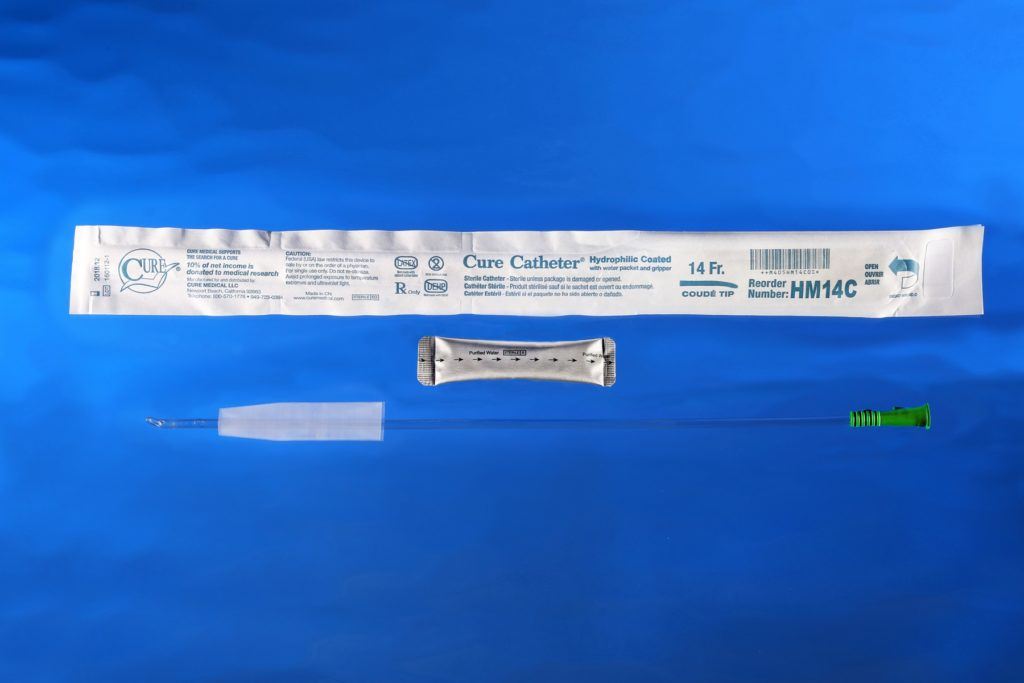 Join the Cure Nation! Choose a Cure catheter like Jerry has.
Join the Cure Nation! Choose a Cure catheter like Jerry has.
Although I’ve used several different brands of catheters since my injury, I’ve found Cure catheters to be the easiest to use, and I’ve had the fewest problems with the Cure catheters. I’m sold on them.
 To request free samples of the new Cure Medical® Closed System or any Cure Medical® catheter, contact your local distributor of quality healthcare products, or click here.
To request free samples of the new Cure Medical® Closed System or any Cure Medical® catheter, contact your local distributor of quality healthcare products, or click here.
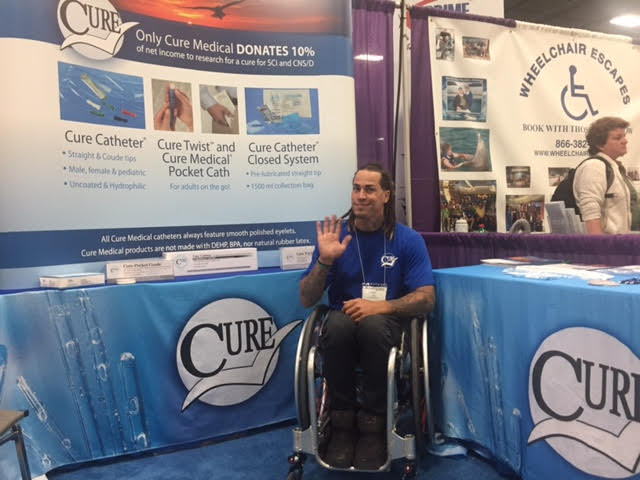
Say hi to Jerry at the Abilities Expos in Houston and Boston!
If you’re interested in learning more about Cure, and why so many people are using Cure’s catheters, come to this website frequently where you can read stories of people just like us, what they’re doing, and why they prefer Cure.”
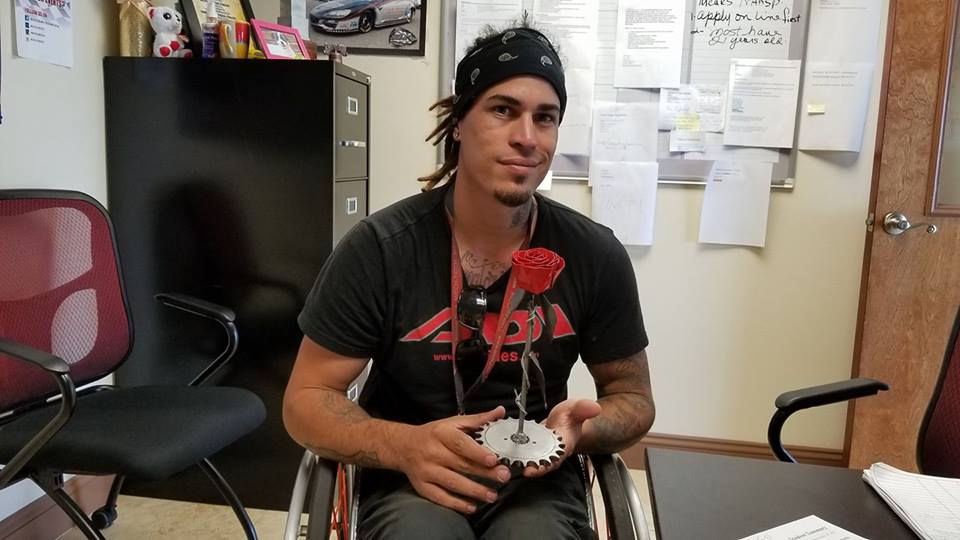
Jerry Beat his Fear to Follow a Passion
“I’m the kind of guy who tries things that seem to be impossible,” Jerry reflects. “I’m fortunate to have friends who tell me I can do things I don’t know I can do. If they think I can do a trick, I’ll try as hard and as long as I can to learn to throw that trick.”
“To get into WCMX, you’ve got to have drive and the will to win.”
“If you don’t, you’ll be ruled by your fear and won’t try any of the tricks. Each time you attempt something, you learn more about how to accomplish a trick, you gain confidence, and you know that one day you’ll be able to throw that trick – even if it takes a year’s time.”
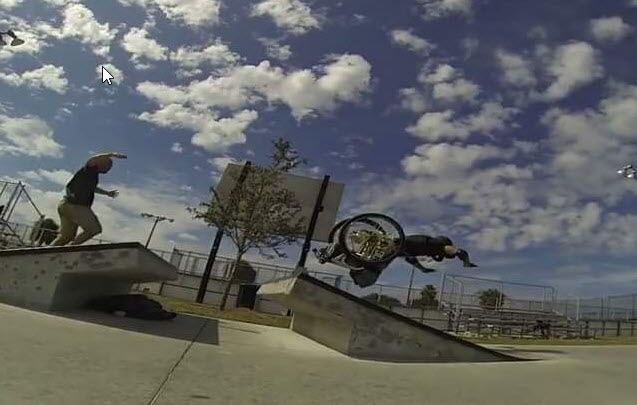
Even the pros like Jerry Diaz wipe out! Be sure to use common sense and follow all safety precautions when attempting WCMX tricks.
Other than having his shoulder banged up five or six times and having to have surgery, plus a few other few scrapes and scratches, Jerry says he’s not gotten hurt that much while doing WCMX.
“I wear a full face lightweight BMX helmet made by Fox Racing that can take heavy impact. If I hit on my face, the first thing I say is, ‘Thank you helmet.’ If I’m doing a trick that involves a lot of speed, I’ll use gloves to keep from getting concrete or asphalt burns. And, my special gloves actually help me grip the wheels.”
When Jerry is up in the air and realizes he’s not going to hit the ramp correctly and probably will fall, he tucks and rolls to not fall straight on his face. He advises you to always take a couple of friends with you to a skate park as a safety precaution.
“If I fall, I’ll ask someone to help me up, and I’ve never had anyone turn me down. I’ve found that there’s always someone who will help someone in a wheelchair.”
To learn more about WCMX, follow them on Facebook.
Follow Jerry at www.facebook.com/jerrydiaz13, Instagram: @uradrenalinerush, YouTube: Jerry Diaz.
Note: Jerry’s flips and tricks are not for everyone, and are risky. Please consult with your physician and use common sense as well as proper safety precautions before attempting something that may be dangerous for your specific condition.
Enjoy Our Free Resources & Articles
 CURE NATION is designed with you in mind, to offer assistance and education when you need it through a personal support program.
CURE NATION is designed with you in mind, to offer assistance and education when you need it through a personal support program.
All of the information you find below and on our related social media pages is meant to guide you to places, topics and, resources that enhance your life, while also connecting you with a growing group of friends.
- Sign up for our free, CURE NATION e-newsletter to have our latest stories delivered directly to you, once a month.
- Get our FREE LIFESTYLE + TRAVEL BOOKS here.
- Have an idea you’d like to share? Let us know.
- Be sure to take a minute to meet our Cure Advocates too.
You may also enjoy:
Multiple Sclerosis Fueled Sylvia Longmire’s Desire to Spin the Globe
The 4 Stages of Acceptance: How Bob Yant Learned to Cope With His SCI
Hurricane Harvey Won't Stop PVA Games Champion "Wheelchair Willie" Hendrickson
Cure Founder Bob Yant: Fighting Paralysis with Persistence and Passion
SB-Inspiration Videos: Adam Guerrero Motivates People Who Have Spina Bifida
HIStory: Paul Speranza
Meet the Downer Family: Open Hearts For Adopting Children with Special Needs
Meet Adaptive Sports Trailblazer Mary Carol Peterson, OT + Home Accessibility Expert

